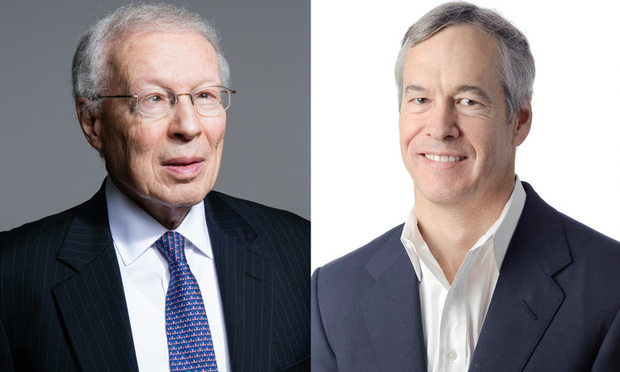Under Growing Pressure, GCs Dig Deeper Into Potential Business Partners
General counsel today feel a growing pressure to conduct due diligence on every potential business partner of the company, according to Brian Meyer, GC of Fir Tree Partners. Fir Tree begins with its own preliminary searches, but for deeper dives Meyer hires someone like attorney Ernest Brod, who is managing director with Alvarez & Marsal's disputes and investigations team.
November 19, 2018 at 04:21 PM
4 minute read
 Ernest Brod, managing director, left, with Alvarez & Marsal and Brian Meyer, general counsel, right, with Fir Tree Partners.
Ernest Brod, managing director, left, with Alvarez & Marsal and Brian Meyer, general counsel, right, with Fir Tree Partners.
General counsel today feel a growing pressure to conduct due diligence on every potential business partner of the company, said Brian Meyer, GC of Fir Tree Partners for 13 years.
For New York City-based Fir Tree, a private investment firm that manages assets for institutional and private investors, for example, that's a lot of due diligence. Meyer said Fir Tree begins with its own preliminary searches, often looking at issues related to possible violations of the Foreign Corrupt Practices Act, Meyer said. The search, however, eventually encompasses labor and human rights issues as well as environmental concerns or possible money laundering or terrorist financing.
For deeper dives, Meyer hires someone like attorney Ernest Brod, a 30-year investigative veteran who is managing director with Alvarez & Marsal's disputes and investigations team.
“We are seeing more and more requests for due diligence on potential business partners of every kind,” Brod said in a recent interview. “And not just in the high-risk countries that make people nervous.”
Meyer said Fir Tree focuses on two aspects of the FCPA: one is the sovereign wealth funds that it manages, which are government instrumentalities. These funds' employees are considered foreign officials under the language of the FCPA, and relationships with foreign officials must be scrutinized. The second aspect is as an investor, perhaps seeking a controlling interest in another company.
If the target “is a minerals company, we might take a different view than if it's a coffee shop,” Meyer explained. “You look at the nature of the industry, and the corruption climate in the countries where the business is located.”
If it's a high-corruption company or climate, or both, “then that's where you do a deep dive,” he said. A few years ago, he said the company was looking to partner in a joint venture in Mexico, and after an initial look, it hired Brod to do the deep dive. “The deep-dive confirmed that there were no red flags, which allowed us to go ahead with the deal,” he said.
Brod explained that there are different levels of intensity for due diligence investigations, and Fir Tree and the investigator mutually decide how deep to go.
“We always start with a very broad public record review, going into blogs and message boards and social networks,” Brod explained. “There's even an artificial intelligence software tool that lets us go below the surface of the web and into blogs and message boards that are not indexed or are hard to find, including on the dark web.”
Searches include obvious lists, such as of U.S.-sanctioned countries or individuals and various regulatory records that might not show up online.
“If we want more, then it's boots on the ground,” he said. “We do field interviews with people who have worked with or for these companies, or sued these companies.” Such personal interviews might reveal hints of impropriety that won't show up in court or agency records, he added.
Brod recalled the worst situation he encountered a few years ago in a country in Asia, where he found a jailed head of state still “pulling the strings” at one company. “Needless to say, the American company [doing the diligence] did not go forward with that relationship,” he said.
Meyer said for his company such findings are rare. “When we hire someone to investigate, we are usually pretty comfortable that it is confirmatory of what we think we've already found in our own search,” he said.
“It would be very unusual to be surprised by the results,” he added. But for Meyer and other GCs, better to be surprised before a deal, than after it's completed.
Correction: This story has been updated from an earlier version to correct a quote in the seventh paragraph. The quote has been corrected from an earlier version to read: “The deep-dive confirmed that there were no red flags, which allowed us to go ahead with the deal,” he said.
This content has been archived. It is available through our partners, LexisNexis® and Bloomberg Law.
To view this content, please continue to their sites.
Not a Lexis Subscriber?
Subscribe Now
Not a Bloomberg Law Subscriber?
Subscribe Now
NOT FOR REPRINT
© 2025 ALM Global, LLC, All Rights Reserved. Request academic re-use from www.copyright.com. All other uses, submit a request to [email protected]. For more information visit Asset & Logo Licensing.
You Might Like
View All
NBA Players Association Finds Its New GC in Warriors Front Office



Trending Stories
- 1States Accuse Trump of Thwarting Court's Funding Restoration Order
- 2Microsoft Becomes Latest Tech Company to Face Claims of Stealing Marketing Commissions From Influencers
- 3Coral Gables Attorney Busted for Stalking Lawyer
- 4Trump's DOJ Delays Releasing Jan. 6 FBI Agents List Under Consent Order
- 5Securities Report Says That 2024 Settlements Passed a Total of $5.2B
Who Got The Work
J. Brugh Lower of Gibbons has entered an appearance for industrial equipment supplier Devco Corporation in a pending trademark infringement lawsuit. The suit, accusing the defendant of selling knock-off Graco products, was filed Dec. 18 in New Jersey District Court by Rivkin Radler on behalf of Graco Inc. and Graco Minnesota. The case, assigned to U.S. District Judge Zahid N. Quraishi, is 3:24-cv-11294, Graco Inc. et al v. Devco Corporation.
Who Got The Work
Rebecca Maller-Stein and Kent A. Yalowitz of Arnold & Porter Kaye Scholer have entered their appearances for Hanaco Venture Capital and its executives, Lior Prosor and David Frankel, in a pending securities lawsuit. The action, filed on Dec. 24 in New York Southern District Court by Zell, Aron & Co. on behalf of Goldeneye Advisors, accuses the defendants of negligently and fraudulently managing the plaintiff's $1 million investment. The case, assigned to U.S. District Judge Vernon S. Broderick, is 1:24-cv-09918, Goldeneye Advisors, LLC v. Hanaco Venture Capital, Ltd. et al.
Who Got The Work
Attorneys from A&O Shearman has stepped in as defense counsel for Toronto-Dominion Bank and other defendants in a pending securities class action. The suit, filed Dec. 11 in New York Southern District Court by Bleichmar Fonti & Auld, accuses the defendants of concealing the bank's 'pervasive' deficiencies in regards to its compliance with the Bank Secrecy Act and the quality of its anti-money laundering controls. The case, assigned to U.S. District Judge Arun Subramanian, is 1:24-cv-09445, Gonzalez v. The Toronto-Dominion Bank et al.
Who Got The Work
Crown Castle International, a Pennsylvania company providing shared communications infrastructure, has turned to Luke D. Wolf of Gordon Rees Scully Mansukhani to fend off a pending breach-of-contract lawsuit. The court action, filed Nov. 25 in Michigan Eastern District Court by Hooper Hathaway PC on behalf of The Town Residences LLC, accuses Crown Castle of failing to transfer approximately $30,000 in utility payments from T-Mobile in breach of a roof-top lease and assignment agreement. The case, assigned to U.S. District Judge Susan K. Declercq, is 2:24-cv-13131, The Town Residences LLC v. T-Mobile US, Inc. et al.
Who Got The Work
Wilfred P. Coronato and Daniel M. Schwartz of McCarter & English have stepped in as defense counsel to Electrolux Home Products Inc. in a pending product liability lawsuit. The court action, filed Nov. 26 in New York Eastern District Court by Poulos Lopiccolo PC and Nagel Rice LLP on behalf of David Stern, alleges that the defendant's refrigerators’ drawers and shelving repeatedly break and fall apart within months after purchase. The case, assigned to U.S. District Judge Joan M. Azrack, is 2:24-cv-08204, Stern v. Electrolux Home Products, Inc.
Featured Firms
Law Offices of Gary Martin Hays & Associates, P.C.
(470) 294-1674
Law Offices of Mark E. Salomone
(857) 444-6468
Smith & Hassler
(713) 739-1250






